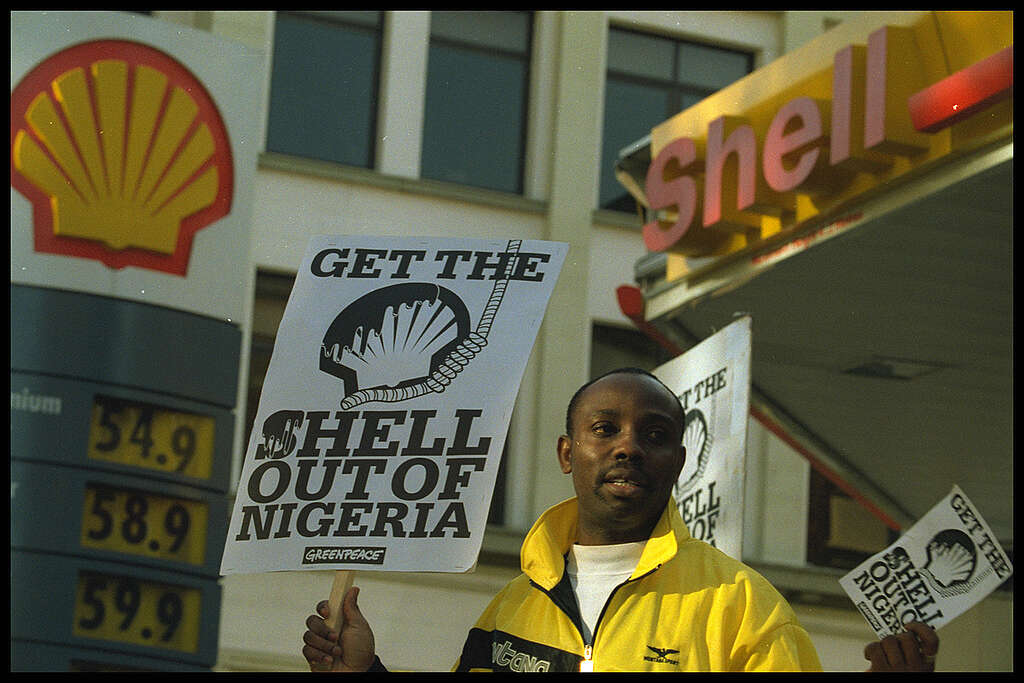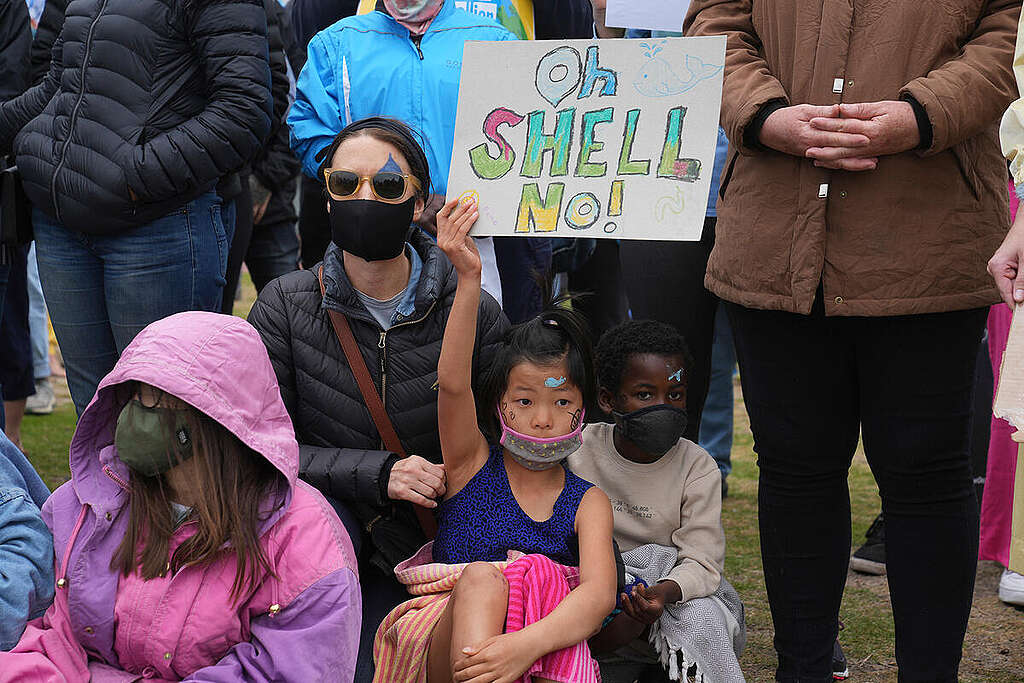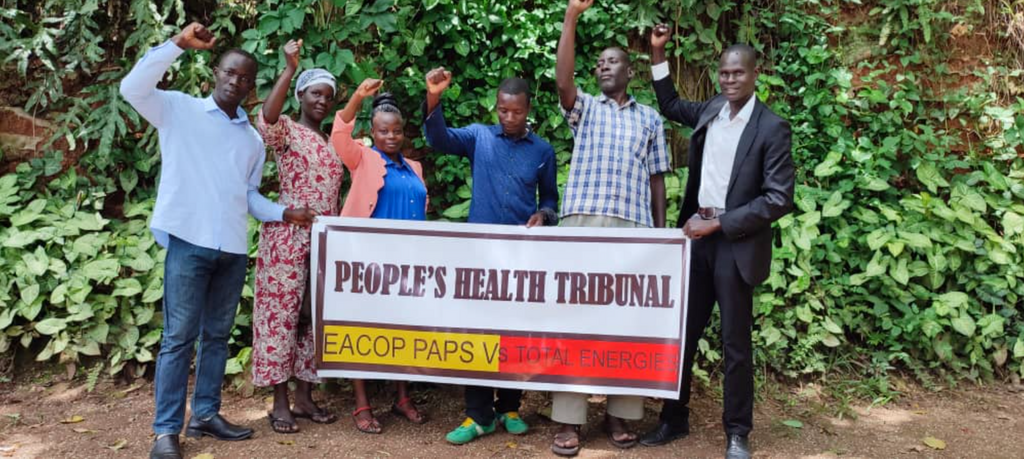In May 2023, communities from South Africa, Nigeria, Mozambique, and Uganda united to testify against corporate giants Shell and TotalEnergies at a groundbreaking People's Tribunal. Their collective voices echoed tales of health crises stemming from extractive projects, calling for reparations and placing community demands at the forefront of the climate justice movement. Greenpeace International and the People's Health Tribunal have collaborated to produce a testimonial video to make their voices heard and demand reparations.
From the Niger Delta to the EACOP pipeline, communities are facing displacement, violence, and ecological destruction at the hands of @Shell and @TotalEnergies
WATCH their demands for reparations in our new video.#EndFossilCrimes #MakePollutersPay #PeoplesHealthTribunal pic.twitter.com/3LqlgK3fk1
— Greenpeace International (@Greenpeace) February 15, 2024
In the Niger Delta, Shell's presence for decades has resulted in oppression, health crises and the destruction of livelihoods. Whilst Shell is trying to leave the delta, the scars remain and the communities' demands for reparations have not been met.
"Today, the Niger Delta is one vast oil field with over 1,481 wells, 275 flow stations, over 7,000 kilometres of oil/gas pipelines and over 120 gas flare furnaces. Our home is an ecological bomb and one of the most polluted places in the world. Remember that the company most complicit in these atrocities, Shell made $40billion in 2022. In the first quarter of this year Shell has already made nearly $10 billion. As we drown in floods, get sick and die, they make more profits." – Ken, Niger Delta

In South Africa, a coastal community is fighting to protect their spiritual sanctuary and fishing livelihood from Shell's attempted offshore drilling.
Mozambicans shared harrowing tales of displacement, militaristic violence, and massacres which they assert are related to Total's gas exploration.
Witnesses from Uganda spoke about being forcibly displaced for TotalEnergies' East African Crude Oil Pipeline. They testified that they are unable to farm their land and protests have been suppressed.
"Total took our family land without my consent… All my livelihood and future plans were destroyed by Total displacement. These days I find it difficult to pay for my children's schooling, feed my family, and access better health services and accommodation for my children. We need our rights to be respected. Our community should live a good, healthy life." – Mugisha, Uganda
These communities brought their struggles and demands for justice to the People's Health Tribunal.
Reparations: a critical part of climate justice
Building reparative justice is essential in addressing the harm caused by fossil fuel companies like Shell and TotalEnergies. Extractive practices, marked by oil spills, air and water pollution and other environmental degradation, by violence, displacement, and other forms of oppression, have far-reaching health impacts, including cancer, mental health problems, spiritual distress, and malnutrition.
Climate reparations is not just 'loss and damage' payments for the impacts of the climate crisis. Reparative justice fights to end harm at sites of extraction, whether they be oil or 'green metal' mining. It aims to prevent this violence from occurring again by addressing the root causes of colonial violence, demanding we transform our world. It imagines what healing from the harm caused by extractivism could look like for communities at the local and global levels.

"As Indigenous communities, we always respect nature. Communities have a right to decide what is good for them, they have a right to say no, they have a right to choose." – Nonhle, South Africa
The People's Health Tribunal highlighted the interconnectedness of health with the land, community, and wider systems of oppression. Instead of viewing health through an individualistic lens, the People's Health Hearing collective who organised the People's Health Tribunal recognizes health as political, collective, and ecological. True health necessitates an end to oppressive systems like racism, capitalism, and colonialism. Health justice, for them, involves healing for all oppressed peoples, healthy ecosystems, territories, and community collective care.
People's Tribunal: seeking justice beyond legal systems

Frustrated by the failure of legal systems to protect communities, movements like the People's Health Tribunal have emerged, allowing silenced voices to share testimony. This alternative approach enables the documentation of evidence, raises public awareness, and builds resistance. Stories are shared on the communities' terms, creating space for emotions, relationships, and ancestral connections, revealing the full extent of harm caused by extractivism.
Beyond conventional court compensation, People's Tribunals envision reparative justice that includes cleaning up after extractive industries, restoring land rights, and moving away from colonial, capitalist systems. Communities, liberated from the constraints of a biassed justice system, can radically reimagine a healing process for both people and the land. Their demands, outlined in the verdict, set powerful precedents for local and global campaigns.
Join the Movement
Let's make these voices heard. Let's bring the People's Health Tribunal conclusions into the public debate. Let's fight for climate justice !







